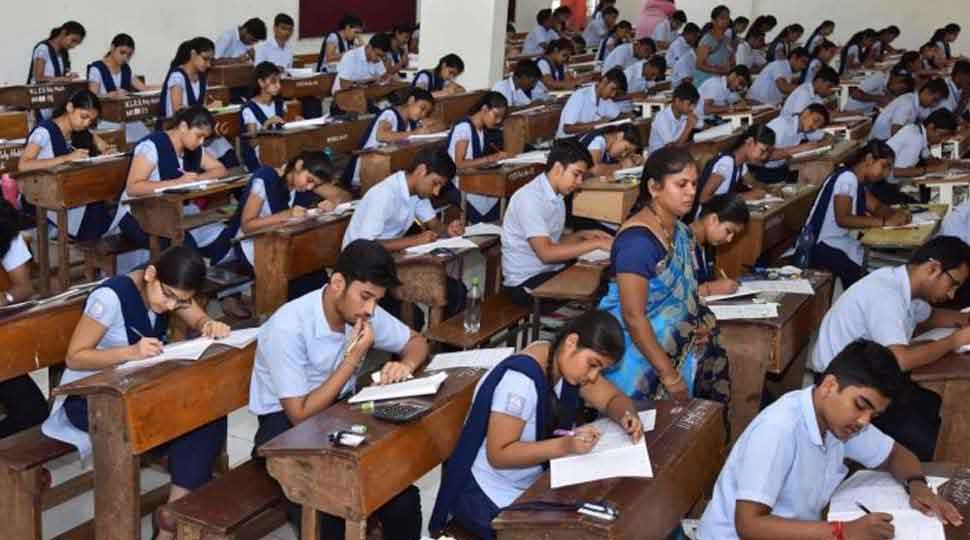
Why raining 100s in Class 12 board exams don't give full marks to TN education

The Tamil Nadu state board exam results for Class-12 released on Monday (May 8) had more than 32,000 students scoring a centum in at least one subject. Even though the number of students who took the exam hovered around 8 lakh — similar to last year — the number of those who scored a centum had a quantum leap. If 23,957 students scored a centum in 2022, the number rose to 32,501 this year.
Educationalists warn we shouldn’t read too much into this. “Private schools ensure students memorise answers. If you question them beyond the textbook, the child will not be able to answer,” educationalist Prince Gajendrababu told The Federal.
Rote learning to ensure higher marks is evident in some subjects, but its limitations are exposed in others. Similarly, even though 690 students scoring a centum in mathematics is seen well within the scope of the subject, 3,909 students scoring 100 out of 100 in chemistry is surprising, said educationalists.
Watch: TN Class 12 results: Plethora of centums that may not translate to much
On the other hand, very few students scored a centum in the languages — English and Tamil. If 15 of them scored full marks in English, only two could score a centum in Tamil.
The Namakkal model
There is a deep rot underneath this high-scoring performance, insisted Prince Gajendrababu.
“What is called the Namakkal model of schooling has become a national phenomenon now. Advertisements are released not just in newspapers but on YouTube and other platforms boasting their students’ scores. A child is forced to go through parallel IIT, JEE coaching from Class 6 onwards. The child’s aspiration or interest is not considered. How will s/he excel in a subject s/he isn’t interested in? It costs them dear when they enter higher education,” rued the educationalist.
Namakkal, which is a hub of broiler chicken industry, also introduced a similar caged method of teaching for human kids a couple of decades back. Leaving just four hours of break each day, the schools around Namakkal trained children for getting admission into premier higher education institutes. Just like a caged broiler chicken, which must eat and get fat throughout the day for the meat market, children must study all the time to get themselves ready for the job market.
Also read: NCERT drops text on Gandhi, RSS ban from Class 12 political science book
What ails TN then?
Schools in Namakkal were able to show a high rate of admission in higher education institutions, making others follow the same method. But it is reportedly costing them dear, both in school education outcomes and performance in higher education, where passion and application of mind are more important.
Numbers speak for themselves. For instance, the Gross Enrolment Ratio (GER) is high in Tamil Nadu (46%), which is nearly twice that of the national average (26%).
Tamil Nadu is next only to Chandigarh, Puducherry, and Delhi is GER. But in education outcomes, the state fares rather poorly. All the southern states beat Tamil Nadu at the school level in education outcomes. According to the performance grading index used by the Union ministry of education, Tamil Nadu schools score 132 points in learning outcomes, which is way below Karnataka (160) or Andhra Pradesh (154).
The issues of schooling are reportedly having a spill-over effect on higher education, too. With higher GER, Tamil Nadu contributes to a huge proportion of engineering students — numbering more than 1.3 lakh last year. But an RTI inquiry by educationalist Jaiprakash Gandhi exposed how 50% students who topped in Class 12 failed in the first semester in Anna University.
Also read: Rejigged Board Exams: Class 10, 12 results to consider previous marks
“It is no surprise that the students find it difficult to cope in higher education institutions. Whether they will become a painter, carpenter, or a scholar is decided in Class 6 itself, without the consent of the child. Finally, when they enter the premises of higher education, they must fit into the needs or they will be shunted out,” he said.
The privatisation bane
Engineering colleges, too, prepare questions and answers and circulate them among students, just like what they do in Namakkal type of schools, said Prince Gajendrababu.
Privatisation and commercialisation of higher education is becoming a spoiler in Tamil Nadu, said Prince Gajendrababu. He cited the trend of appointing ad-hoc teachers in colleges and universities since 2016. “Profit-motivated private institutions don’t hire qualified teachers and exploit them with a meagre salary. This has a direct impact on the quality of education,” he said.
“We shouldn’t forget that India once boasted of being the country with the second-largest contribution of scientists to the world. Importance of basic science education made it possible. All of them (scientists) were produced by public institutions with public funding. The arrival of private institutions has pushed us into a mad rush for making market-ready candidates. This has cost us dear on developing knowledge base, skill sets, or preparing them better for the social reality,” he said.


